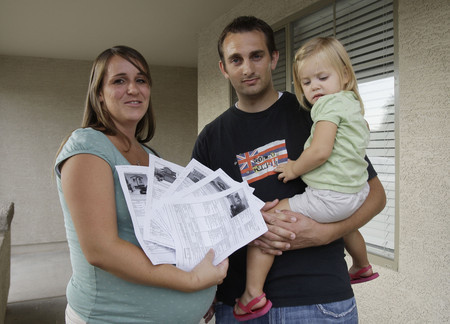House hunting getting harder
PHOENIX -- Each time Lance and Kelli Thorson thought they had found their first home, someone would outbid them. It's already happened at least 15 times.
This wasn't how it was supposed to be in a depressed housing market like Phoenix. Buyers are supposed to be able to walk in, and get pretty much whatever they want. Now, the Thorsons have taken up a tactic not seen since the heydays of the housing bubble -- they are making offers on homes before they've seen them, as many as three per day.
"It's frustrating because we've jumped through all the hoops and there still isn't a reward," Kelli Thorson said.
In Phoenix suburbs and other areas of the nation saturated with foreclosed homes, low prices for bank-owned properties are sparking bidding wars that drive up sale prices, entice investors and frustrate traditional buyers who make dozens of offers and still can't land a home.
Realtors in Las Vegas, which leads the nation in foreclosure rates, are seeing the same thing.
"It happens all the time," David Lampe of Henderson Valley Realty said. "When you put in an offer, you've got to go $10,000 to $15,000 over asking price. Every property has multiple offers -- eight, 10, 15 -- unless it's overpriced."
Analysts say the environment is strikingly similar to what they saw at the height of the real estate bubble.
"This market is about as abnormal as the hypermarket that we came out of a few years ago," said Jay Butler, director of the Realty Studies program at Arizona State University.
Just as they did during the boom period, investors now are stocking up on homes, driving up prices and forcing traditional buyers to the sidelines, Butler said.
The market won't stabilize until investor influence diminishes and it is once again driven by buyers who plan to live in the home, Butler said.
The problem is centered in newer, lower-priced communities affordable for young families and other first-time home buyers. They're the same neighborhoods that were overrun with foreclosures as mortgage rates adjusted and home values dropped.
Homes are now listed at much lower prices than when they were sold just a few years ago. In the Phoenix area, the median resale home price last month was $125,000, down from a peak of nearly $265,000 three years ago. Prices have risen from a low of $115,500 in April, when agents say they began seeing a buying frenzy.
Real estate agents have been noticing the problem for the past two to three months, said Walter Molony, a spokesman for the National Association of Realtors.
It is especially acute in heavy foreclosure areas such as Las Vegas, Phoenix, Southern California and Southern Florida, where prices are correcting to levels well below their peak during the boom, Molony said. In those areas, it's not uncommon for sellers to get multiple offers.
Federal legislation designed to help people stay in their homes has slowed the flow of foreclosures into the market, lowering the inventory and increasing the demand for remaining homes.
In Maricopa County, which includes metropolitan Phoenix, nearly 32,000 homes are on the market, down 30 percent from January.
In Southern Nevada, home inventory stood at 20,613 in June, compared with 23,388 in the same month a year ago, according to the Greater Las Vegas Association of Realtors. A record 4,702 homes were sold during the month, 74 percent of them foreclosures and 38 percent cash transactions.
Sue Naumann, president of the Realtors association, said she hasn't seen offers in Las Vegas going as far above list price as those in Phoenix. Still, bank-owned homes are priced to sell and are getting multiple offers, so it's advisable to submit your best offer, she said.
Nevada Title Co. reported 3,930 single-family home sales in June with a median price of $182,052, or $88 a square foot, down 38 percent from a year ago.
Review-Journal writer Hubble Smith contributed to this report.






















